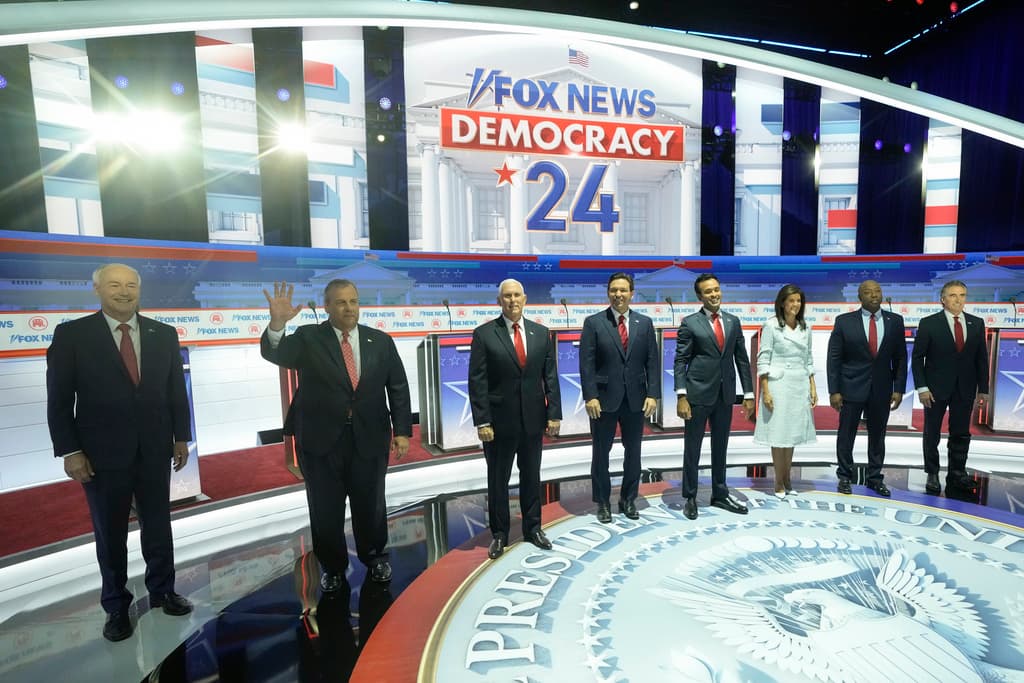For GOP Candidates Aiming at Trump, First Debate Appears To Be Flash in the Pan
Surveys from before and after the first GOP debate show that the debate appears not to have had a lasting effect on candidates’ standing in the polls.

With the first GOP primary debate a week in the past and the second a month in the future, it looks as if the debates may amount to mostly theater in this Republican primary.
After the first debate, it appeared that businessman Vivek Ramaswamy enjoyed a slight boost, that Governor DeSantis failed to reverse his downward trajectory, and that voters were beginning to take notice of Ambassador Nikki Haley.
Yet new polling suggests that the debates had little longer-term effect on candidates’ standing in the Republican primary, apparently owing to President Trump’s commanding lead.
Surveys conducted by YouGov for the Economist illuminate this point. In their August 15 poll ahead of the first GOP debate, Mr. Trump was the candidate of choice for 53 percent of the party members, followed by Mr. DeSantis at 11 percent and Mr. Ramaswamy at 4 percent.
In the YouGov and Economist poll conducted after the debate, released August 29, the pollster found that Mr. Trump was the first choice of 51 percent of the GOP primary electorate who responded to the poll, followed by Mr. DeSantis at 14 percent and Mr. Ramaswamy at 4 percent.
Ms. Haley saw the biggest relative jump in support between the two polls, seeing it rise to 4 percent post-debate from 2 percent pre-debate.
A co/efficient poll released earlier this week had similar findings. Between its August 6 and August 30 poll, it found Mr. Trump increased his support by 3 points while Mr. DeSantis’s support was stable at 13 percent, Ms. Haley’s support was stable at 7 percent, and Mr. Ramaswamy’s support was stable at 4 percent.
While some, such as the Wall Street Journal’s editorial board, have praised the debate as a success, writing that, in the absence of Mr. Trump, “Voters were able to hear eight other candidates and size up their policies, sparring abilities and differences,” the event has done little to dent Mr. Trump’s lead in the polls.
The second debate looms. Scheduled for September 28 at the Ronald Reagan Presidential Library at Simi Valley, California, it will be hosted by Fox Business Network and Univision and moderated by Fox News’s Stuart Varney and Univision’s Ilia Calderón. Mr. Trump, again, is not expected to attend.
This time around, the Republican National Committee is upping the requirements to appear on the debate stage. All candidates will be required to hit at least 3 percent in two national polls or 3 percent in one national poll and 3 percent in an early-state poll. The first debate required candidates to reach only 1 percent in the polls.
Candidates will also be required to have at least 50,000 unique donors, with at least 200 unique donors from a minimum of 20 states or territories, up from the first debate’s 40,000-donor requirement.
After the first debate, Mayor Francis Suarez of Miami became the first candidate to drop out of the GOP primary, saying, “While I have decided to suspend my campaign for President, my commitment to making this a better nation for every American remains.”
Ahead of, or in the wake of, the second debate, it’s possible that other candidates will begin to drop out, especially if Mr. Trump’s poll numbers are as commanding as they are now.

